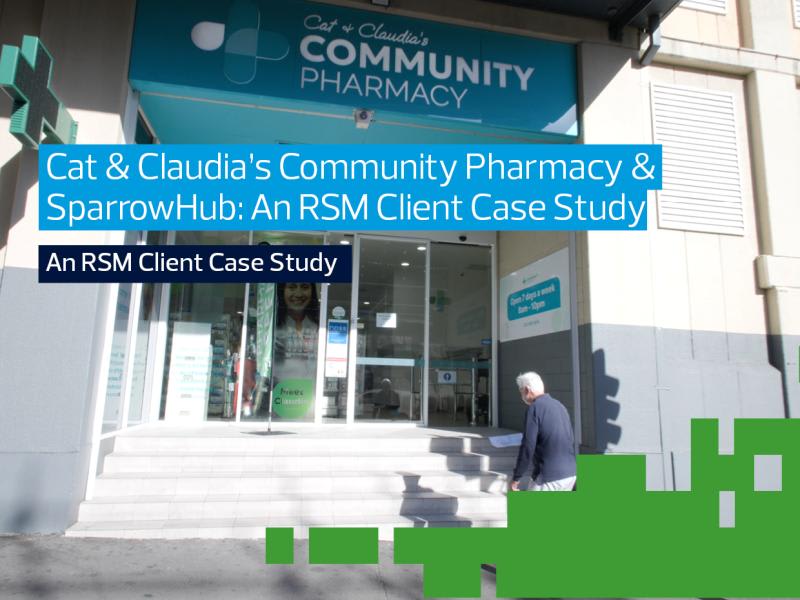Report outlines likely impact of pharmacy dispensing changes: $200k profit hit per pharmacy, up to 10,000 jobs lost.
National professional services firm RSM Australia has released a paper outlining that the impact of 60-day dispensing will cripple many pharmacies and questioning whether savings will accrue to concession card holders.
The impact of the Federal Government’s initiative of 60 day dispensing for prescriptions for certain drugs from September 1 has the potential to “blow a huge hole in a healthcare system the rest of the world envies”, according to RSM Australia’s former national health leader Peter Saccasan.
Mr Saccasan and RSM’s national pharmacy leader Kian Ghahramani have authored a report that looks closely at the data and the detail around the government announcement, in particular at suggested efficiency savings and the impact of the decision on Australia’s 6000 pharmacies.
“The likely profit loss per pharmacy outlined in our report is more than 50% of net profit, and for most pharmacies a loss of over $200,000 when all impacts are considered (see p2 for calculations),” Mr Saccasan said.
“Additionally, the cutback in hours and the fact that pharmacists will likely have to charge for other services to mitigate the profit hit actually means concession card holders could be worse off under this proposal.
“Our analysis shows pharmacy staff reductions could be 5,000 employees, and it could be as many as 10,000 employees, based on the assessment that at least 5,000 pharmacies may need to cut one to two staff to go some way towards saving costs in their business,” Mr Ghahramani said.
“Many pharmacies may have to cut more: how else do you find over $200,000 in savings? This is real money coming out of real businesses owned by real families who have put their lives (through Covid) and most likely their homes (to buy the business – just like any other business owner) on the line,” he said.
The RSM paper outlines how the speed and extent of these changes will cripple pharmacy businesses, with the Health Department itself noting “there will be little time for business owners to transition to other income sources”. Mr Saccasan said the Government’s insistence that they are returning efficiencies to pharmacy and that this should overcome all problems is “mischief-making at best and is contributing to an anti-pharmacy sentiment that prevails in some quarters on this issue”.
Consumer cost savings questioned
60-day dispensing is being promoted as a cost-of-living measure providing savings to more than six million Australians. However, there are many concession card holders who will not save a cent.
“Once a concession card holder hits $262.80, they get free medicine. This 60-day dispensing measure eliminates $43.80 of that spend - however, the safety net has not been changed and according to Federal Health Minister Mark Butler it won’t be changed so concession holders who take many medicines a year will still be spending that extra $43.80 before they are eligible for free medicine,” Mr Saccasan said.
Lost profit (not revenue) estimate 
RSM Australia acts for many retail pharmacies and RSM clients have provided details of the likely impact of the change in policy. The impact by individual pharmacy will vary considerably according to its operating model, its dispensing volumes for impacted PBS items, types of medicines dispensed and demographic and regional variations.
The data provided to RSM included an estimate of lost scripts and a decline in foot traffic through lost store visits. This can be translated into lost retail sales and lost gross profit on those sales. Further, the reduction in visits will reduce the level of professional services (which generate income) that can be provided. And this loss comes straight off their bottom line. It is lost profit and not simply lost revenue.
“The Department’s own analysis projects a loss of $158,000 in the dispensary. RSM’s data is also showing there will a 24% drop in store visits and 22% reduction in script volume. We assess lost visits will result in a loss of gross profit of around $39,000 per pharmacy (at least $27,000 lost from sales of general medicines and other retail categories and around $12,000 in lost professional services income), giving a total loss of $197,000.
“We believe the take-up on double dispensing will exceed the Department’s estimates and push the possible losses over the $200,000 mark. Pharmacies make no more than any other small business on the bottom line and this loss will be over 50% of their profit before they have paid the bank and paid their taxes.
“Like all health professionals, the pharmacy sector supports a more efficient healthcare system that delivers better healthcare at an affordable cost to patients. However, I fail to see how the approach taken in implementing the dispensing change is a fair and equitable sharing of the costs to deliver that outcome,” Mr Saccasan said.
Less than $350m to be returned to community pharmacy - not $1.3bn and certainly not $3bn
There has been a long and loud protest from the pharmacy industry, matched by repetitive pushback from Labor whose MPs continue to focus on the savings to patients and insist the efficiencies being made are going back into pharmacy, ignoring the total loss to pharmacy. 
“No Government MP makes any reference to what this measure is costing pharmacy owners,” Mr Saccasan said.
“On the Government’s own numbers, this measure is saving patients $1.8b, saving the Government $1.2b - and the statement that no Government MP will make is that this entire $3b is coming straight out of the pockets of pharmacy owners, all $3b of it.”
The RSM report indicates that the savings to “more than six million Australians” are being funded directly by pharmacies through the cuts to their dispensing and related fees and that, contrary to Government expectations, line by line analysis indicates less than $350m of funding that is new income to pharmacy is effectively being returned to pharmacy businesses. Not the $1.3bn of “efficiencies”, and nothing like the $3bn this is costing retail pharmacy, he said.
“The Department itself advised the Minister that there will be little time for business owners to transition to other income sources. Why are they surprised at the response they have received from the small business owners who make up the heart of the pharmacy sector?”
About 60-day dispensing changes: Sixty day dispensing of Pharmaceutical Benefits Scheme medicines: From 1 September patients can obtain prescriptions of double the supply of an initial list of 100 PBS medicines, with 2 additional tranches being released on 1 March and 1 September 2024, increasing the list to 325 medicines.
Download the report: 60-Day Dispensing Policy | RSM Australia
FOR MORE INFORMATION
In relation to any questions for clarity on this topic, please reach out to your nearest RSM adviser and we can provide an introduction if required.





